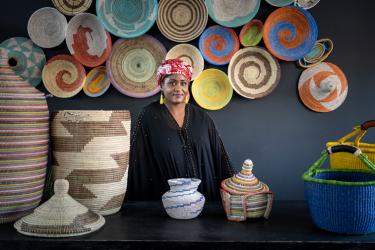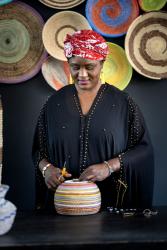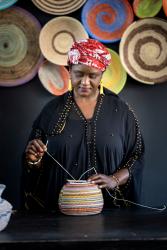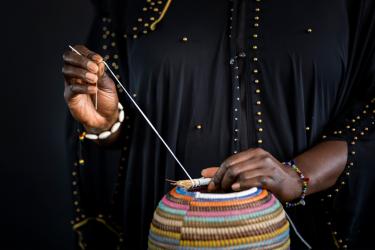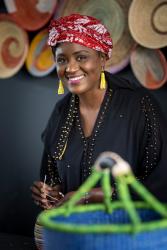Born in Senegal, West Africa, artist Sofi Seck learned the art of basket weaving from her mother. “Weaving is a generational art form that is passed down from one generation to the next. I learned from my relatives, just as my mom and her mom did,” she says.
After her parents’ divorce as a child, Sofi’s mother began saving money to send her to America, believing that through education, Sofi could break the pervasive cycle of being forced to depend on a man for survival. “She had no formal education, so she weaved, sewed and created things to sell, hoping against hope that she could save enough money to buy me a plane ticket to America,” Sofi says. “In time, she did just that.”
Speaking no English and knowing nothing about the culture, Sofi moved to St. Louis in high school and has been here since. While recovering from a back injury, she was struck with an immense desire to help other women and girls in her home country get the education they need to thrive in modern times. “I closed my photography business and have poured my entire being and resources toward creating and advancing the social enterprise that is Expedition Subsahara,” she says. “Our mission is to open and sustain a STEAM school for girls in Senegal.”
To achieve this mission, Sofi weaves and sells what many of her customers refer to as happy baskets. “I get a lot of emails from people who love their ‘happy basket,’” she says. “I get so many of these emails, in fact, that the phrase has become a part of my brand. I love getting positive messages about how our products helped people create a happy space in their home.”
She makes the baskets using sweet grass and recycled plastic. First, the grass is harvested, washed and laid out to dry. Then, it’s washed and dried again, making it stiff. The grass is then bundled into coils and woven using the recycled plastic of old, shredded prayer mats. “The larger baskets require a lot of womanhandling to get the right shape,” Sofi notes. “The most difficult part is definitely the design, as you have to count stitches and rows to make sure it geometrically makes sense and that the shape is symmetrical.”
By the end of this year, Expedition Subsahara will be able to buy the land for the STEAM school, the goal they’ve been working toward since day one. “At Expedition Subsahara, we make happy baskets and accessories for colorful people,” Sofi says. To learn more about Sofi Seck and her work, visit her website at expeditionsubsahara.com.


